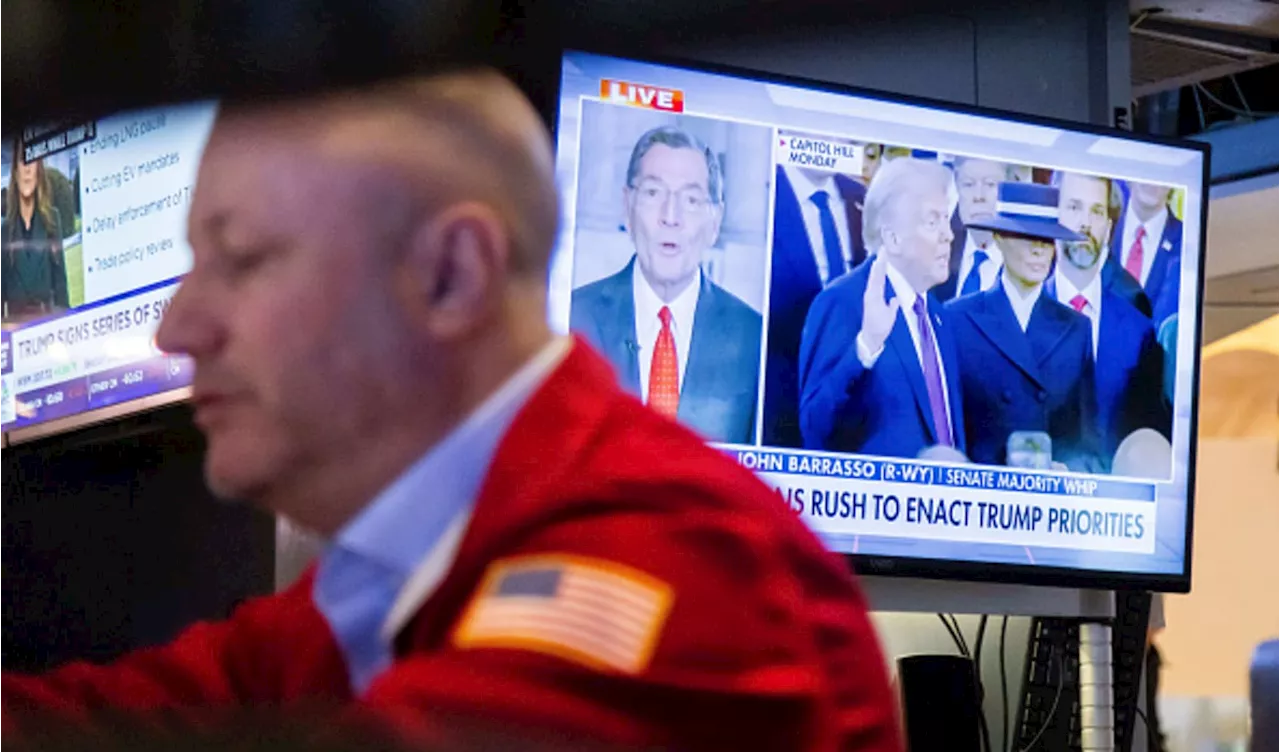The announcement of potential tariffs on goods from Canada, China, and Mexico triggered market fluctuations on Monday, highlighting the dual forces that shape market behavior: fundamental economic indicators and investor sentiment. Experts advise investors to remain focused on long-term strategies and not overreact to short-term volatility. Simultaneously, consumers are urged to proactively assess their household budgets in anticipation of potential price increases stemming from tariffs.
Plans for tariffs on goods from Canada, China, and Mexico prompted markets to temporarily fall on Monday. The events are a reminder that two forces drive the markets — underlying fundamentals and sentiment, according to Larry Adam, chief investment officer at Raymond James. But when it comes to sentiment, this may be a wake-up call for investors who came into the year thinking the threat of tariffs was not a realistic risk, he said.
'We're not changing our forecast,' Adam said, which includes a year-end 6,375 target for the S&P 500. As of Monday afternoon, the index was hovering around 6,000. \The impact of these tariffs, while concerning, are relatively small, Adam noted. Tariffs from Canada and China are fairly small, he said, with 1% coming from both Mexico and Canada, and 7% from China. For individual investors who are wondering what, if anything, to do next, 'this is where the value of an advisor truly shines,' said Cathy Curtis, a certified financial planner and founder and CEO of Curtis Financial Planning, who is also a member of the Financial Planning Association. Curtis said she is telling clients, 'President Trump has consistently used tariffs as a negotiating tool, and we can expect this pattern to continue.' Curtis said she's urging clients to focus on the long-term gains they may see by staying the course, rather than overreact based on short-term headlines. \For individuals, the threat of tariffs has implications for both their investment portfolios and everyday household budgets. Even in the face of sudden market volatility and uncertainty, financial advisors say it's best not to make any sudden moves with your portfolio. Still, sudden market volatility may be a wake-up call to some investment strategy adjustments that need to happen, advisors say. That starts with a gut check to see whether you're comfortable with your equity allocations in the event of steep losses. It is also important to be mindful of your portfolio's international exposure, which could be affected by tariffs, said CFP Marguerita Cheng, CEO of Blue Chip Financial Services. Retirement savers ought to take a look at their target-date funds — investments that automatically adjust to an anticipated retirement date — to make sure they're not exposed to more international investments than they want, Cheng said. Current retirees should make sure they have enough money in cash and stable value funds to ensure they can fulfill their required minimum distributions and other immediate needs without having to sell their investments at an inopportune time, she said. The impact of tariffs on everyday life may increase with the implementation of tariffs. Consequently, consumers who have faced years of higher prices due to elevated inflation may now want to reassess their household budgets once again. To get ahead of those potential cost increases, it helps to evaluate how much you're spending. Forgoing a vacation, extra items at the grocery store or additional trips in the car can help save money now in the event higher costs hit later, Baker said. 'A little forethought in planning might help you avoid the sticker shock that could come from your grocery bill or particular items that are being threatened with tariffs,' said CFP Douglas Boneparth, president and founder of Bone Fide Wealth
TARIFFS MARKET VOLATILITY INVESTOR SENTIMENT CONSUMER BUDGETS ECONOMIC INDICATORS
United States Latest News, United States Headlines
Similar News:You can also read news stories similar to this one that we have collected from other news sources.
 Trump's Tariff Threats and the Impact on Global MarketsThis news report discusses President Trump's inauguration day policy announcements regarding tariffs, the potential impact on global markets, and contrasting opinions on protectionism. It also touches on recent developments in the stock market and artificial intelligence investments.
Trump's Tariff Threats and the Impact on Global MarketsThis news report discusses President Trump's inauguration day policy announcements regarding tariffs, the potential impact on global markets, and contrasting opinions on protectionism. It also touches on recent developments in the stock market and artificial intelligence investments.
Read more »
 Copper: Tariff threats keep the metals markets on edgeCopper dropped below $8,000/t in yesterday’s trading session after US President Donald Trump’s latest in a series of tariff threats, ING’s commodity analysts Ewa Manthey and Warren Patterson note.
Copper: Tariff threats keep the metals markets on edgeCopper dropped below $8,000/t in yesterday’s trading session after US President Donald Trump’s latest in a series of tariff threats, ING’s commodity analysts Ewa Manthey and Warren Patterson note.
Read more »
 Trump's Tariff Threats Boost US Dollar, But Sustainability Remains UncertainThe US Dollar (USD) surged in early trade as headlines suggested President Trump might declare a national economic emergency to justify new, broadly applied tariffs. While rising US yields, fueled by strong economic data, contributed to the USD's strength, experts suggest this might not be as powerful a support as in past months. The potential for looser fiscal policy under the Trump administration, coupled with overvaluation concerns, casts doubt on the long-term sustainability of USD gains.
Trump's Tariff Threats Boost US Dollar, But Sustainability Remains UncertainThe US Dollar (USD) surged in early trade as headlines suggested President Trump might declare a national economic emergency to justify new, broadly applied tariffs. While rising US yields, fueled by strong economic data, contributed to the USD's strength, experts suggest this might not be as powerful a support as in past months. The potential for looser fiscal policy under the Trump administration, coupled with overvaluation concerns, casts doubt on the long-term sustainability of USD gains.
Read more »
 AUD/USD Dips on Trump Tariff Threats and Strong US Labor DataThe Australian dollar weakened against the US dollar as President-elect Donald Trump's potential tariff threats and robust US labor market data fueled gains in the greenback.
AUD/USD Dips on Trump Tariff Threats and Strong US Labor DataThe Australian dollar weakened against the US dollar as President-elect Donald Trump's potential tariff threats and robust US labor market data fueled gains in the greenback.
Read more »
 Mexican Peso Plunges Amidst Tariff Threats and US Dollar StrengthThe Mexican Peso (MXN) weakened against the US Dollar (USD) on Wednesday due to heightened risk aversion triggered by potential new tariffs and positive US economic data. Traders are awaiting key economic indicators for further direction.
Mexican Peso Plunges Amidst Tariff Threats and US Dollar StrengthThe Mexican Peso (MXN) weakened against the US Dollar (USD) on Wednesday due to heightened risk aversion triggered by potential new tariffs and positive US economic data. Traders are awaiting key economic indicators for further direction.
Read more »
 AUD/USD Declines as US Labor Data and Tariff Threats Boost DollarThe Australian dollar weakened against the US dollar on Wednesday, reaching 0.6215 amid strong US labor market data and renewed tariff threats from President-elect Donald Trump. While Australian inflation data showed a slight increase, it failed to counter the impact of the positive US economic indicators and cautious market sentiment following the release of the FOMC December meeting minutes.
AUD/USD Declines as US Labor Data and Tariff Threats Boost DollarThe Australian dollar weakened against the US dollar on Wednesday, reaching 0.6215 amid strong US labor market data and renewed tariff threats from President-elect Donald Trump. While Australian inflation data showed a slight increase, it failed to counter the impact of the positive US economic indicators and cautious market sentiment following the release of the FOMC December meeting minutes.
Read more »
